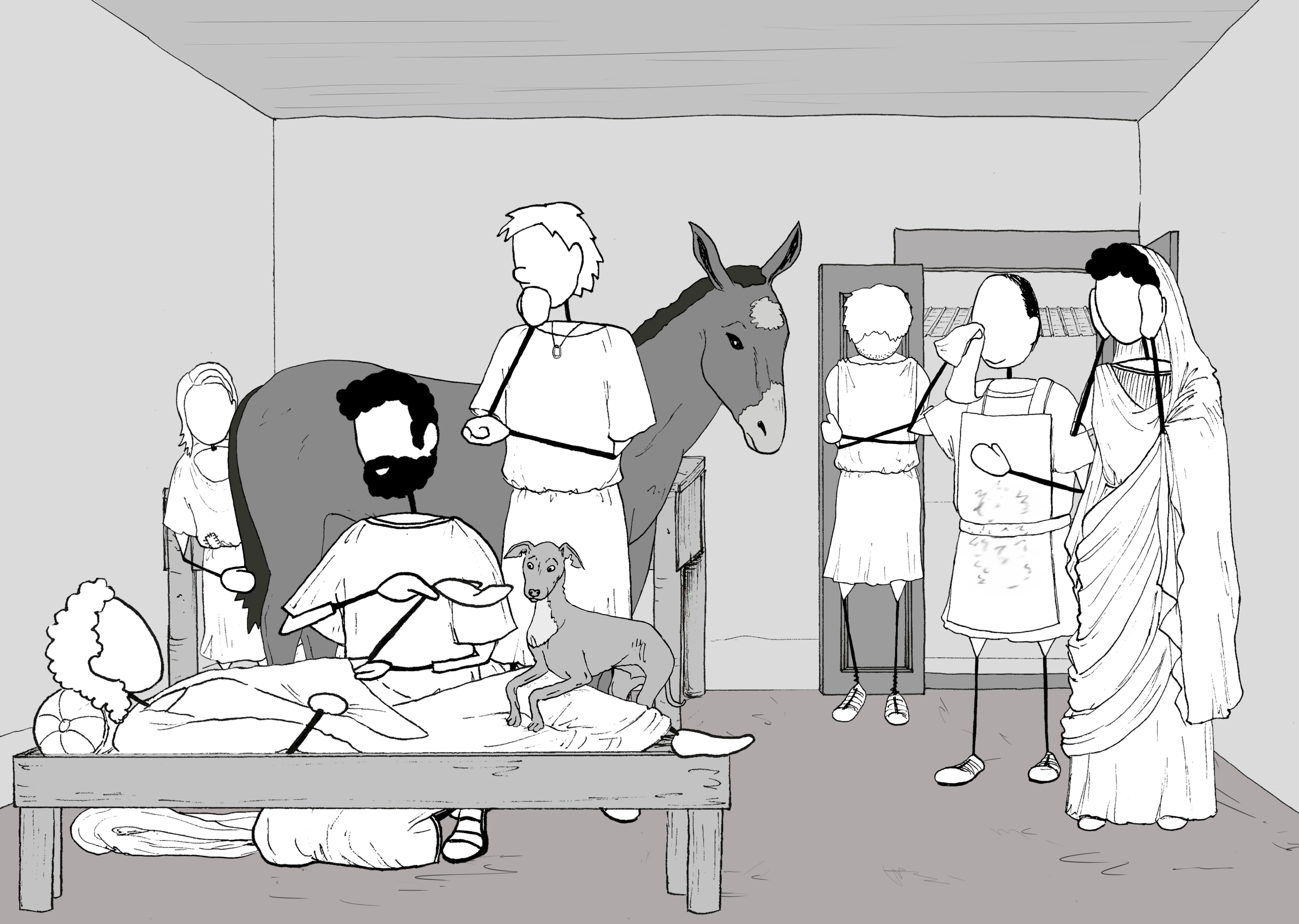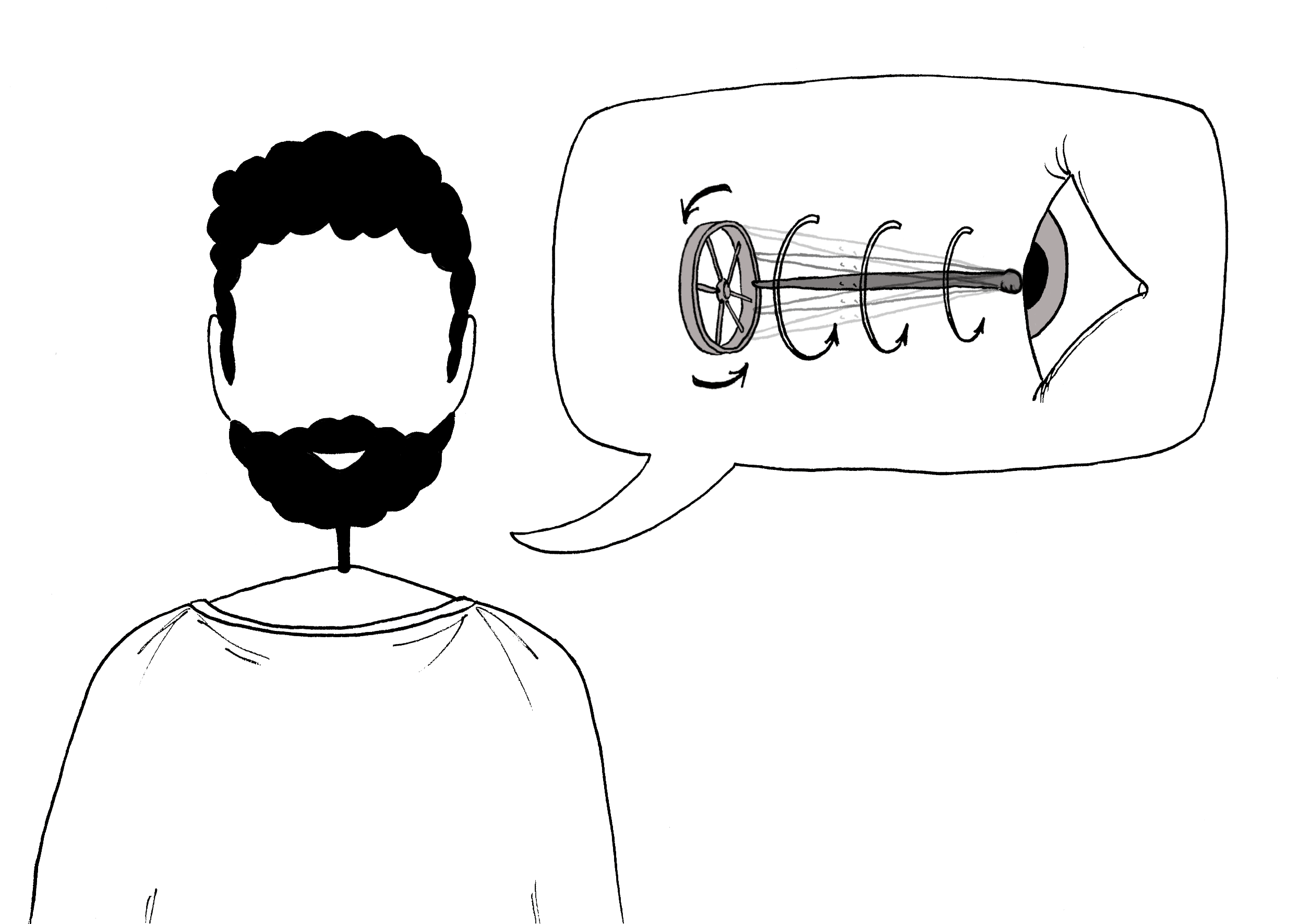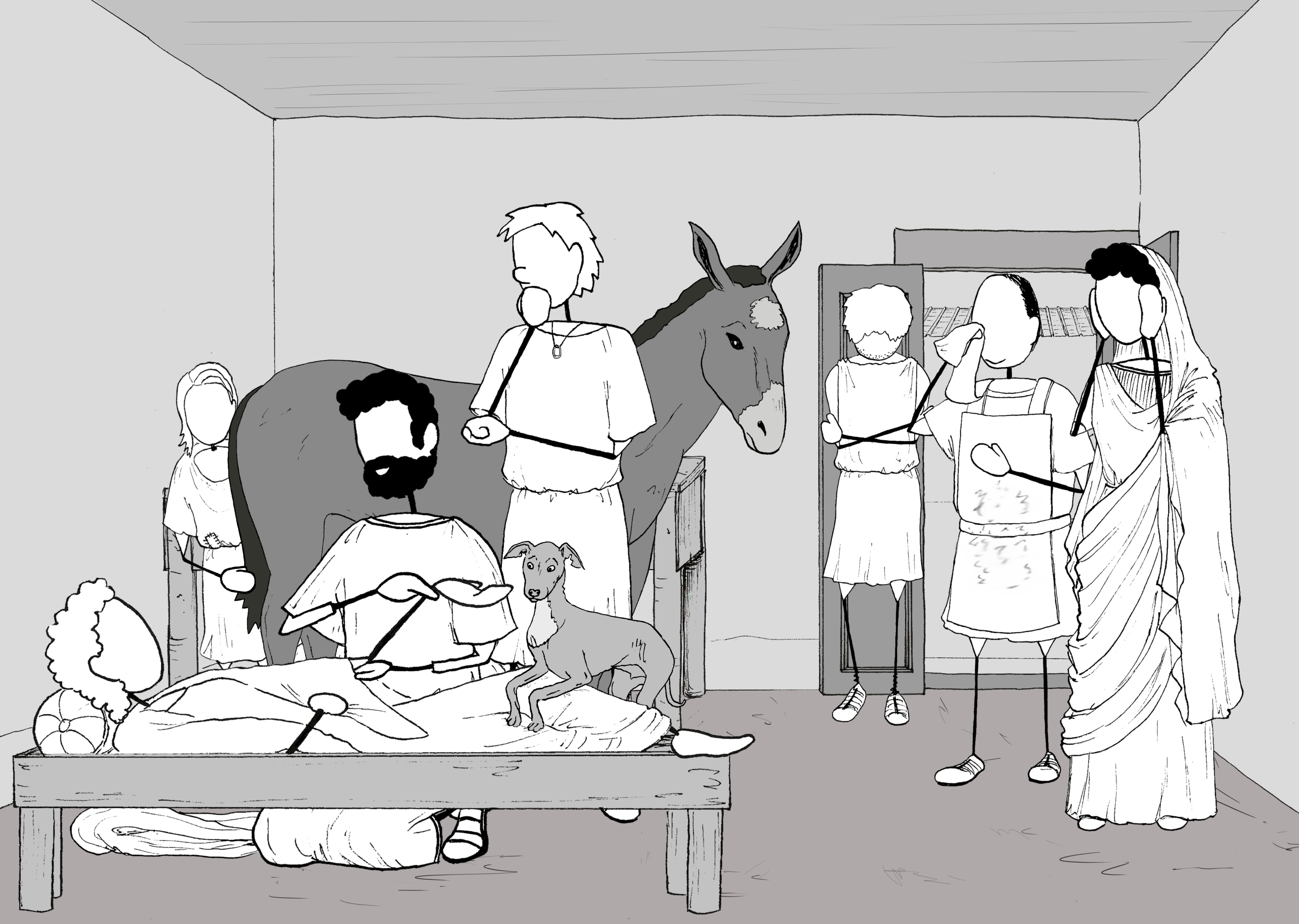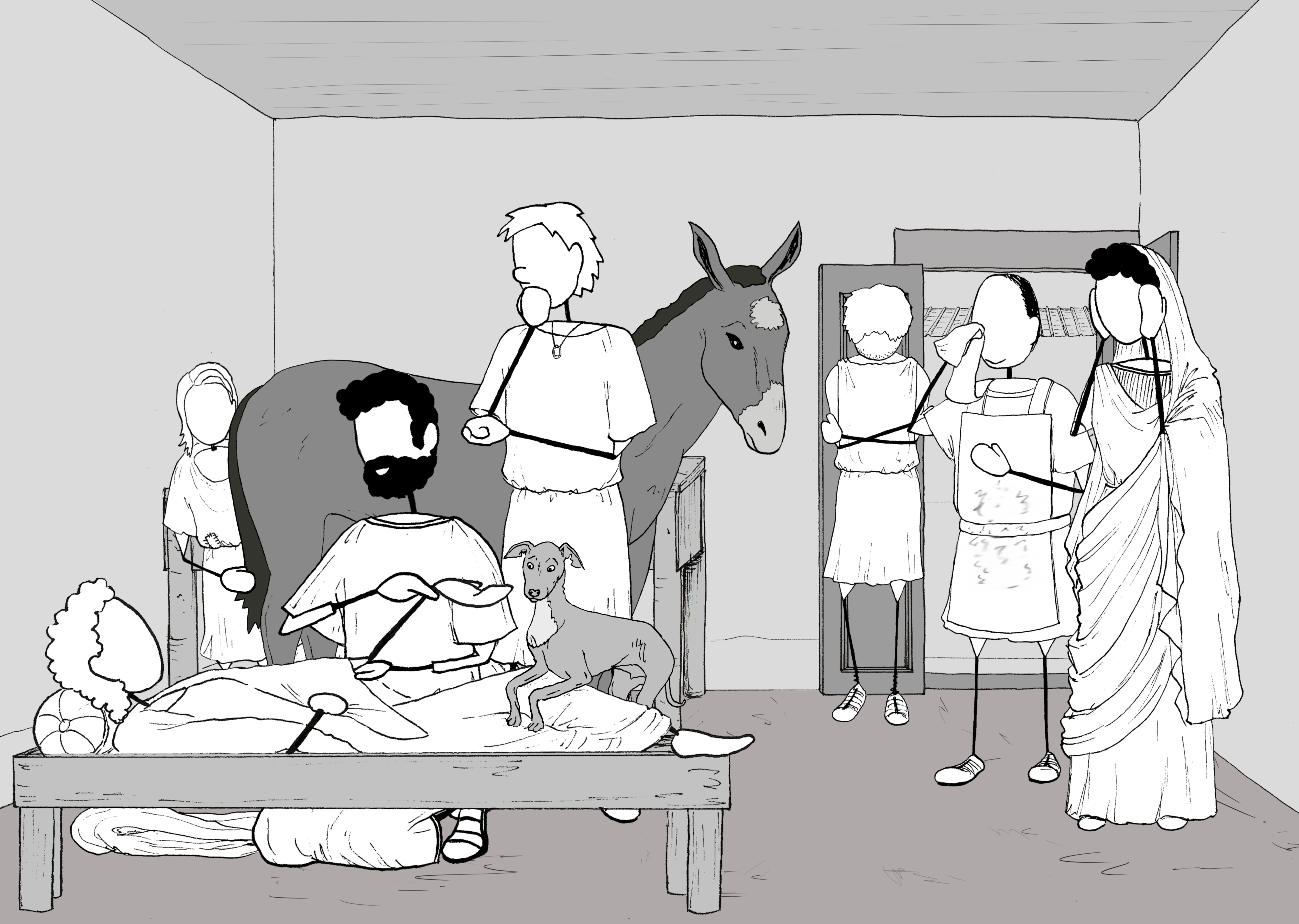|
|

It is the Kalends of October and Amarantus is pacing up and down in the atrium. Grata fainted while working at her loom and he sent Sophe the street urchin to fetch Hypatus, a new doctor in town and therefore still willing to make house-calls until his reputation is established. At last he hears Scumni’s deep voice yell, ‘I think they’re coming!’ Everyone calls Scumnicolus ‘Scumni’ these days. He hardly ever fills his former role as doorkeeper; he is too busy serving in the bar, which is a success and now well in profit. But this is an emergency; everyone loves Grata and is worried about her. ‘Yes,’ shouts Scumni to Amarantus. ‘It’s them!’ A moment later he shows the doctor into the atrium. Hypatus is a Greek with a dark beard and kind eyes, about the same age as Amarantus. ‘Where is my patient?’ he asks. |
|
|
‘In here,’ says Amarantus, opening the door of his own room. The doctor raises an eyebrow. ‘In here with the animals?’ Amarantus nods. ‘They comfort her.’ Standing among bales of hay, Potiscus gives a soft snort as if to say Indeed I do. Amarantus leads the way, followed by the doctor, Scumni and curious Sophe. Pompeia and Coquus stand in the doorway. On a cot in the far corner of the dim room, Grata is propped up by bolsters from the triclinium and wrapped in a light woollen blanket she herself wove. Pertinax lies curled up at her feet. When the doctor approaches he lifts his head and growls. ‘Don’t worry, little pup.’ Hypatus the Doctor pats Pertinax’s head. ‘I’m here to help.’ Amarantus bites his fist in anguish as the doctor bends over Grata, who is looking pale and tired. ‘Hello, my dear,’ says the doctor. ‘What ails you today?’ ‘Things far away are blurry,’ says Grata. ‘I have to squint to see.’ He nods sympathetically. ‘We call that myopia, which is Greek for Squinty-Eye. It can come with age, especially if you read or do a lot of weaving.’ ‘I weave,’ says Grata. ‘How many hours a day?’ ‘Six or seven, in the morning. Then I work in the bar.’ ‘Tell him how you fainted,’ urges Amarantus. ‘Sometimes,’ says Grata, ‘everything seems to spin around me and then I fall down.’ ‘Any other symptoms? Do you have ringing or buzzing in the ears?’ ‘No, sir.’ ‘Split pupil? That is to say, double vision?’ Grata shakes her head. ‘Pain in the head or sparks before the eyes?’ ‘No, but sometimes I am wrapped in darkness ...’ The doctor takes her wrist between his fingers. ‘Your pulse is thin as a thread and timid as a hare,’ he says after a moment. Then he pulls back her eyelids to examine her eyes. He grunts and then asks over his shoulder, ‘Do you have any of her urine I can taste?’ ‘No,’ says Amarantus. ‘Shall I get out the chamberpot?’ ‘Not strictly necessary.’ He stands straight and turns to Amarantus and Pompeia. ‘She has skotoma,’ he says. ‘Darkness?’ says Amarantus. The doctor nods. ‘Also known as “vertigo”.’ He turns back to Grata. ‘You know you have something called pneuma flowing through your veins?’ Grata shakes her head. |
  |
‘It’s your life-force and it brings sensations to your soul, your psyche, the invisible part of you that gives you consciousness.’ ‘Pneuma,’ says Grata as if tasting the word. And then, ‘Psyche.’ ‘Yes. I hold with those who believe that some of your pneuma comes out of your eyes in an invisible stream, like a walking stick or a cone. When it touches things, it perceives them. That is how you “see”. But if you have too much phlegm in your body – too much cold wetness – your pneuma is weakened and can be affected by what it sees. When the walking-stick-pneuma emitted by your eyes touches a wheel or a hoop then the sight of the moving object twirls your soul and you get dizzy.’ Grata’s face brightens. ‘I do often get it when I use a spindle.’ The doctor turns and bows to Amarantus and Pompeia. ‘That confirms my theory.’ |
  |
‘What can we do?’ asks Pompeia. ‘There are two cures we can try,’ says Hypatus the Greek. ‘First, phlebotomy, which means vein cutting.’ ‘That sounds scary,’ says Grata. ‘It is a bit. I will have to cut a vein in your head to let out some of the excess moisture.’ ‘Won’t I bleed?’ ‘That’s the idea.’ The thought of Grata bleeding makes Amarantus feel queasy. ‘What’s the other cure?’ he asks. ‘The food cure,’ says Hypatus. ‘The great doctor Hippocrates said, “Let your food be medicine and let your medicine be food.” Like most women,’ he says to Grata, ‘you are phlegmatic by nature, that is to say cold and wet. I believe your problem is caused by a diet of wet and cold foods, like salads and fruit. You must balance your temperament by eating hot, dry foods such as grilled cockerel, roast meat and lots of honey.’ ‘Honey is a hot food?’ ‘Most certainly. First of all, it is yellow like bile, the humour that predominates in choleric people. Second, it is made by bees tamed by smoke from a fire. Third, the anger of hot-tempered Achilles is said to be “sweeter than drops of honey”. So, I prescribe warm hydromel first, that is to say honey-water, and then as many honey-sweetened roast meat dishes as you like.’ Grata hangs her head. ‘What’s the matter?’ says Doctor Hypatus. ‘Most people are pleased when I tell them to eat more honey.’ Grata murmurs something. ‘What?’ Grata lifts her head and looks straight at Amarantus. ‘I vowed never to touch honey again, because my greed for it cost a dear friend his freedom.’ Amarantus stares at Grata. He suddenly understands why she sometimes refuses food made with honey, even though he knows she loves it and that she is always hungry. What a sacrifice she made for him! He has no words. Pompeia moves closer to Grata and speaks gently. ‘Your friend is now free, and I believe he forgave you long ago.’ She glances at Amarantus, who nods. ‘So, as materfamilias I declare that your vow no longer applies.’ She turns to Coquus. ‘Will you bring Grata some warm hydromel as the doctor prescribed? And I believe there are some honey-cakes in the red jar.’ Coquus nods and uses the napkin he always wears draped over his shoulder to wipe away a tear. For the first time in ages, Grata gives a radiant smile. Then her smile fades and she looks around in alarm. ‘What is it?’ cries Amarantus, rushing forward. ‘If everyone is in here with me,’ she says, ‘then who is watching the bar?’ |

